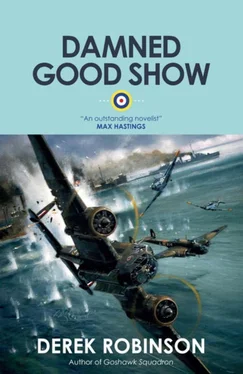The cross-country exercise was a triangular flight: base to Carlisle, to the bombing range near Porthcawl in south Wales, back to base. Gilchrist worked out the routes with some help from a friendly observer called King.
“Avoid flying over towns,” King said. “Leeds, York, Sheffield, Liverpool, they’re liable to have a balloon barrage up.” Gilchrist made a note. “Don’t trust your compass,” King said. “One degree out, and you’re fifty miles off track. Get pinpoints if you can.” Gilchrist wrote that down, and asked: “What are the best pinpoints to look for? Rivers? Bridges? Crossroads?” King shrugged. “All rivers look alike to me,” he said. “Towns are the best landmarks. You know where you are with a whacking great cathedral.” Gilchrist scratched his head with the blunt end of his pencil. “Big enough for a cathedral,” he said, “won’t it be big enough for a balloon barrage?”
King nodded. “It’s a bastard, isn’t it?”
At least the weather was good: bright and dry, with high white cloud. Gilchrist was not fooled. He had flown clapped-out Hampdens at his OTU, he knew how cold a leaky cockpit could be, he was well wrapped up beneath his Sidcot suit and fleece-lined boots, and already he was sweating as he followed Duff. They went up the narrow ladder that was hooked to the walkway on the port wing. The walkway led to the cockpit canopy, and the sliding hood on the canopy roof would be open, waiting. Duff turned and flapped his gloves, waving Gilchrist away. “This entry is for the gentry,” he said. “Tradesmen use the back door.”
“Sorry.” Gilchrist had to turn and shuffle back down. The ground crew and a corporal wireless operator watched, boot-faced. Sprog pilot puts up a black. That’s what they’d be thinking. Can’t find his way to the nav position. Jesus wept. The walkway was narrow. Suppose he slipped now and trod on the port flap. It was only canvas-covered, he’d put a boot through it, the kite would be unserviceable. What a colossal black… He reached the end and the ladder was waiting. They’d known he’d be coming back.
He ducked below the wing and clambered in through a door at the side of the under gunner’s compartment. There was no powered turret; just a cell where the fuselage ended and the tail-boom began. Fancy being alone in here for umpteen hours, sealed in by a bulkhead. Not a cheery prospect. He squeezed sideways through a door in the bulkhead and walked uphill, slowly and clumsily. At its maximum, the Hampden’s interior was three feet wide. So was Gilchrist, carrying a parachute pack and a navigator’s bag; and obstructions narrowed his path: oxygen bottles, fire extinguishers, cables, hydraulic pipes, parachute stowages and awkward-shaped chunks of unidentified equipment.
He struggled over the main spar, a massive alloy girder that linked the wings to the fuselage. Now he was standing behind the pilot’s seat. Directly above it was the sliding hood. If he had followed Duff through that space, he would have ended up sitting in Duff’s lap, with nowhere to go except back out through the hood. What an idiot he’d been, worrying so much about navigating that he forgot he wasn’t the pilot. Failed before he began.
A crawl-space under the pilot’s seat led down to the nose cockpit. Gilchrist slid through it feet-first. The nose was roomy; he had a swivel-seat, a folding table, plenty of light. He took out his maps and studied the route again. Almost immediately he knew something was wrong. Panic nibbled at his guts. Once, on stage during a first night, he’d forgotten his lines. Now he felt the same rebellion in his stomach: not butterflies but bats, bloody great bloodsucking bats. The port engine fired and grew to a thunder that made the bomber shake. Gilchrist put on his helmet. Then he remembered. He plugged in the intercom.
“Ah,” Duff said. “So glad you could join us.”
“Sorry, skipper.”
“Sorry isn’t the word. Pathetic is better.”
At takeoff the navigator’s position was behind the pilot. Gilchrist went up the crawl-space on his hands and knees and sat on the main spar. Takeoff was exhilarating. Duff built the engine revs higher than Gilchrist would have dared, got the Hampden bounding across the grass faster and into the air sooner than he thought possible. At a thousand feet Gilchrist slid back to the nose cockpit. Plugged in the intercom. A dull roar filled his ears.
“Navigator to pilot. Steer three one zero degrees.”
No answer.
He said it again. No answer. His repeater compass showed they were flying on zero eight zero degrees: almost due east, instead of northwest. “Navigator to pilot,” he said, and the Hampden dropped its left wing so steeply that he had to grab the table. Maps, pencils, papers, calculators were scattered. The left wing came up slowly. He relaxed his grip. At once the right wing dropped steeply and he fell out of his seat.
This went on for some minutes. Then the bomber stopped rolling and began pitching: diving and climbing, plunging and rearing. Gilchrist tasted the wretched memory of his last meal. The pitching ended. He was on the floor, collecting maps, when Duff asked: “Where are we, navigator?” Gilchrist looked out and saw nothing but sea. “Up the creek,” he said.
“The course we’re on will take us to Norway, if that’s any help.”
“Turn back,” Gilchrist said feebly. “Fly west.”
“Too vague, old son. I need an exact course.”
“If it’s any help,” the wireless operator said, “we’re twenty miles southeast of Spurn Head.”
Gilchrist found a map and made a wild guess. “New course two eight zero, repeat two eight zero. Please confirm.”
“No need to shout,” Duff said. “I heard you the first time.”
The Hampden turned and flew sedately for the next half-hour. Gilchrist recognized landmarks—the great gash of the Humber estuary, the four-square mass of York Minster—and he recalculated the route to Carlisle.
“I’m losing power in the starboard engine, navigator,” Duff said. “I’m not going to risk crossing the Pennines. Give me a course to Newcastle and then I’ll fly up the Tyne Valley.”
Gilchrist did it. Ten minutes later Duff said the engine had recovered and he’d decided to risk the Pennines after all. Gilchrist scrapped his calculations and began all over again. He gave Duff the new course. Duff said it would take them over an army gunnery range: not wise. Gilchrist worked out a large dog-leg to avoid this. Duff then became worried about a nearby Spitfire squadron, notoriously trigger-happy. Gilchrist worked out another big dog-leg to avoid that. His map was a mess.
They missed Carlisle by about forty miles. “That’s Lake Windermere down there, skipper,” the wireless operator said. “I had a jigsaw puzzle of it when I was a kid. Know it anywhere.”
“Forget Carlisle, navigator,” Duff said. “Give me a course for Porthcawl.”
He climbed to twelve thousand feet, above the cloud. Now they were breathing oxygen. Gilchrist could see no landmarks. After two hours of dead reckoning he decided they were four miles north of Porthcawl. “Navigator to pilot,” he said. “ETA Porthcawl two minutes from now.”
Duff dived through the cloud. To Gilchrist the land was a vast map of a foreign country. “Any guesses?” Duff said. He kept diving. Gilchrist had lost all faith in himself. He saw water but it looked wrong so he stayed silent. Still Duff lost height.
“Cardiff,” the wireless operator said. “There’s the Arms Park, where the Welsh play the rugby internationals. By the river.”
Gilchrist stared at his map, at the thirty-mile gap between Porthcawl and Cardiff. “I don’t understand,” he said. “I double-checked everything. Twice.”
Читать дальше












